Sumary
< Leadership and Self-Deception > 和它的续集(前传) < The Anatomy of Peace > ,是由美国亚宾泽协会写的。从第一本的内容来看,它的初衷是要讨论在商业公司里,人与人之间的沟通问题和解决之道。不过这套方法论是普世的,拿来个人用在工作生活就我看来反而是更加「现实」和有效。相信第一本卖得肯定不错,于是它们接下来又写了 < Anatomy > 主要讨论人与人之间冲突是如何诞生演化的,以及我们如何解决。不过其实两本书溯源同根,是同样思维的不同表述而已。
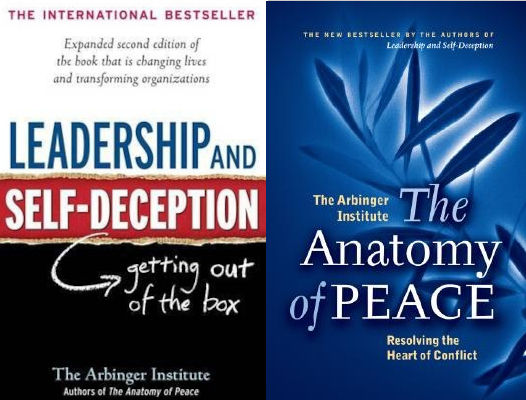
书里论述的东西也都不「新鲜」,工作和生活里我们已经经历过很多次,从古至今有无数的思想从个角度阐述过:同理心,穿别人的鞋,开放思维,对事不对人 … 不论儒教的「仁」,还是各种宗教灌输的「善」,都是用类似的实践来指导我们如何和别人相处,在写《~最后生还后的惆怅~》的时候也提到了,「善待他人」即是个人利益的最大化。在我看来这两本书有趣的地方是,它没有从道德的角度切入,而是总结出了一套实践方法,期望更 programatic 地达成我们希望合作的愿望。怎么说呢,相当理工科思维 :p
What is the Books about?
两本书的主旨是:我们绝大多数人,在和别人相处时都容易进入一种 in the box 的状态。当我们处于 in the box 时,会带有偏见去看待他人,甚至不再把他们当作「人」,于是只有更多的冲突。
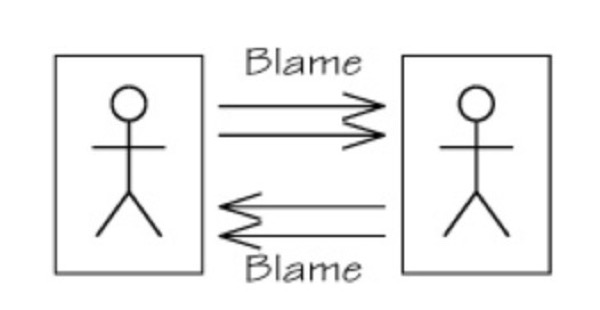
首先与别人相处时,我们的初心非常重要,是内心「和平」还是「交战」?毫无疑问处于交战模式中的话,一开始就已经进入了 in the box 的状态:
- When we have a heart at peace, we see the other person as a human being. We recognize that, like us, they’re people with real hopes, dreams, doubts, fears and struggles.
- When we have a heart at war, we see others as objects. We dehumanize them by reducing them to a category (e.g. Blacks, Rich, Arabs), a role (e.g. employee, customer, politician), or a quality (e.g. jerk, ungrateful, dishonest). We stop thinking of them as unique human beings, and only see them only as an obstacle (“he’s going to make me late for work”), a vehicle (“he’s going to make me rich”), or something inconsequential (“I don’t care what he thinks”).
不过即使我们初心是「和平」的,也不是一切就顺利了,因为这个状态能不能保持仍然是一个问题。有时候当一件事我们做出了「违心」的决定,也会进入盒子里。譬如别人质疑一件我没有做好的事情,我心知肚明却想掩饰,我们就会从此进入 in the box 的状态。做出「违心」的决定是一种自我的背叛 ( Self-betrayal ),这种自我背叛也是一种自我的欺骗 ( Self-Deception) 。
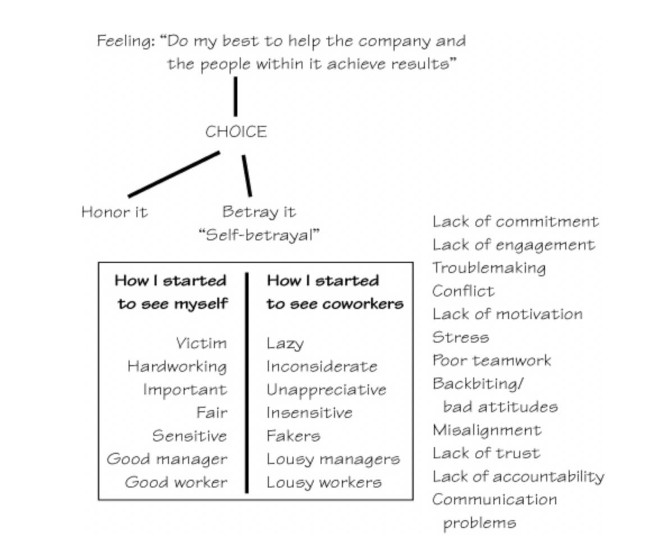
可以从一些很典型的开脱方式,来帮助我们发现自己在自我欺骗 ( Self Deception ) , 因为我们需要用类似的方式来正义化自己的行为,进而掩盖真相:
- 高人一等 Better-Than :认为自己优越、重要、善良、正确;而他人都低等、无能、无关紧要、虚假错误;所以会感到不耐烦、轻蔑和无动于衷。
- 理所应当 Must-Be-Seen-As:认为自己值得夸奖、被错待的、是受害者、不被赏识;而他人都爱误会人,错待他人、不知感恩;所以会感到理应被善待、被剥夺了权力,进而产生怨恨。
- 重视他见 Worse-Than:当我们软弱时常会觉得自己虚伪;而他人都有威胁性、是我的观众;于是会感到不安和害怕、缺爱、压力大、难以承受;认为世界很危险,自己时刻都被盯着,都爱批评自己。
- 低人一等 I-Deserve:觉得自己没有别人好,破碎而不足,所有的一切都是命中注定;而他人却是得天独厚和幸运的;于是感到无助、嫉妒、怨恨和压抑;感觉世界都在和我作对。
书里总结了这四类「开脱」,这些思维模式会 self-justifying 自我的形象,然后形成一道「有偏见的墙」,最后让我们进入 in the box 的状态。当有人质疑这些形象时,会被我们认为是危险信号,如果他们试图于加强他们的主张,我们则会把他们当作异类而忽略掉。看看 Self-betrayal 一步步具体导致发生了什么:
- An act contrary to what I feel I should do for another is called an act of “self-betrayal.”
- When I betray myself, I begin to see the world in a way that justifies my self-betrayal.
- When I betray myself, I begin to see the world in a way that justifies my self-betrayal.
- When I see the world in a self-justifying way, my view of reality becomes distorted.
- So—when I betray myself, I enter the box.
- Over time, certain boxes become characteristic of me, and I carry them with me.
- By being in the box, I provoke others to be in the box.
- In the box, we invite mutual mistreatment and obtain mutual justification. We collude in giving each other reason to stay in the box.”
一旦我们 in the box ,即使我们想继续和别人沟通交流,都不会再有实际的效果了:
- Trying to change others ( 显而易见 )
- Doing my best to “cope” with others ( 显而易见 )
- Leaving ( 离开也不是解决方法,因为我们认为问题在别人身上,离开并不能让 Box 消失 )
- Communicating ( 显而易见 )
- Implementing new skills or techniques ( 身处 Box 之中时,熟练的技巧和技术反而会变成世故的攻击手段 )
- Changing my behavior ( 如果我们的关注点是自己,是无法真的改变自己的行为的 )
How to get out of the Box ?
那我们要从 Box 里出来,该怎么办呢?We can’t get out by continuing to focus on yourself ,我们想 get out 就要改变思维模式,所首先必须多质疑自我,question ourselves,反思自己的行为:
- Self-betrayal leads to self-deception and “the box.”
- When you’re in the box, you can’t focus on results.
- Your influence and success will depend on being out of the box.
- You get out of the box as you cease resisting other people. ( 明晰自己的问题,放下对抗的心态 )
不过跳出 Box 一次容易,但是要长久的处于 out of box 就不易了,我们需要做到:
- in order to stay out of the box, have to always be doing things for others
简单地说即是要吾日三省吾身,始终质疑自己的决定和判断,始终站到别人角度看问题,始终帮助别人,往促成结果的目标去努力而不是关注在自己能不能有好的结果。其实孔老夫子几个字就说明白了:己所不欲,勿施于人;己欲立而立人,己欲达而达人。
具体怎么用书里的知识,书里也明确地给了有趣的建议,希望我们不要和别人谈概念、原则、方法,只需要做好自己:
- Don’t try to be perfect. Do try to be better.
- Don’t use the vocabulary—“the box,” and so on—with people who don’t already know it. Do use the principles in your own life.
- Don’t look for others’ boxes. Do look for your own.
- Don’t accuse others of being in the box. Do try to stay out of the box yourself.”
- Don’t give up on yourself when you discover you’ve been in the box. Do keep trying.
- Don’t deny that you’ve been in the box when you have been. Do apologize; then just keep marching forward, trying to be more helpful to others in the future.
- Don’t focus on what others are doing wrong. Do focus on what you can do right to help.
- Don’t worry whether others are helping you. Do worry whether you are helping others.
书里还提到了可操作的方法 The Pyramid of Change:
When we’re unhappy with someone or something, we tend to focus narrowly on what’s wrong and fight head-on to get what we want. If someone is already upset with you, criticizing and challenging them will only make things worse. Instead of focusing on what’s wrong, focus on helping to make things right by seeking to support the other person. Instead of forcing people to change (which won’t work), it’s much more effective to invite them to change.
And, you can invite change using the steps in the Pyramid of Change. Here’s a quick graphical overview of the pyramid Do get our complete 12-page The Anatomy of Peace summary for details and tips for applying the pyramid:
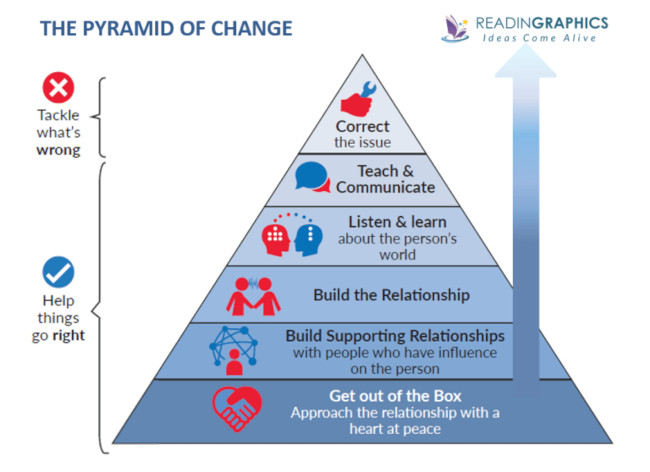
- Get out of the box and approach the relationship with a heart at peace
- Build relationships within the person’s network
- Build your relationship with the person
- Genuinely seek to listen and learn about the other person
- Communicate/teach your proposed solution (based on a true understanding of the other person and his needs/concerns)
Unless the above components are addressed, any attempt to correct or change a behavior will fail.
其实换个角度想想,是不是就是说先和别人成为「朋友」?
Q&A 自问自答
Q:究竟该如何实践?
首先,我们要防止自己 in the box,能做的只有改变自己。首先把握好自己的初心,最难的是在关注做出「违心」选择的时间点,因为念头太快,目前的经验来看最有效的方法是给自己缓冲的时间,强迫自己停下几分钟,甚至几秒钟也是有益的,做出「慢决定」。如果真的发生了 Self Deception 也别太担心,吾日三醒,开脱的四种模式应该很容易让自己看清自己的真实意图,知错能改就好。
Q:如果保持 Out of Box 的方法是帮助所有人,我虽然想,但是这么多人,做不到啊?
书里有明确回答过这个问题。有想法但是做不过来这事,和 in the box 时不愿去为他人考虑时不同的。一个虽然做不到,但是还是继续存在着这个意愿,为之努力;另一种情况是不把他人当「人」,已经不再愿意为他们设身处地着想了。
Q:Box 都是不好吗?
理论上来说 Box 是绝对不好的,如果我们人生目标是成为更好的人的话。
但有些灰色地带可以讨论,仔细想想书里的 Box 在有些情况是不是会跟 Mask 这个概念有些重合。我门成长过程中伴随成长的 Box 也好,Mask 也好,一定程度来说也是我们的保护壳,有害也有用。类似电影《The Invention of Lying》,谎言会出现是因为它有用啊。
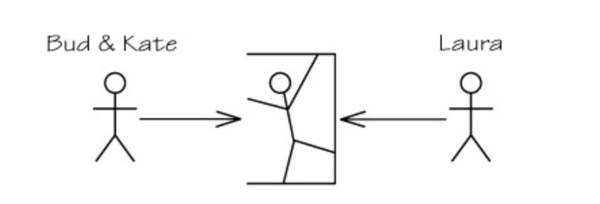
我们不能改变别人,我们也不能保证别人总是 out of box,甚至有些人内心就是对别人开战的。这个时候不妨开启 transparent box,不过前提是自己要能跳出三界,能看到自己的状态,并且可以「内心和平」地开启防护罩。应激的 Box 在任何情况下都是坏的。
Q:这套理论,真的能在公司里实践吗?
这是我最大的疑惑,直觉来说,小公司还有可能用合伙人类似的方法,保持大家的开放性。不过天下没有不散的宴席,如果人不愿意改变,只能动刀裁人了。然而稍微大一点的公司就很不一样了,错综复杂的「利益」关系下,保持 out of box … ? 实际生活不是非黑即白的,如同上面所说,如果是 transparent box,你可能根本无法辨析。当大家都玩厚黑学时,还是回到了百害无一利的境地。而且也需要花费大量时间来关注管理这些「行为」,这也需要管理者有着相当高的 EQ 和技巧。 书里 CEO 亲自下场花上一两天功夫指导中层改变心态这事?有多大的可操作性 …
不过普及一下这样的知识,还是非常有必要的,因为如果我们都能看清自己的状况,至少能一定程度抑制这样的行为。即使是选择对一部分打开我们的 Box ,也是有益的结果了。